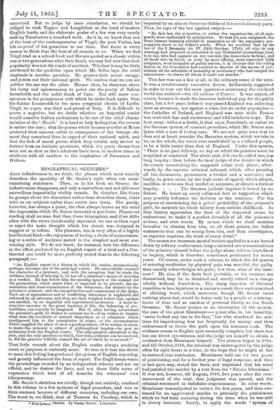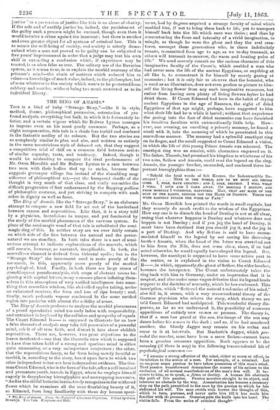BIOGRAPHICAL SKETCHES.* ABLE talkativeness is, we think, the phrase which
most exactly describes the specialty of Mr. Senior's style when not cross- examining statesmen. Then, as in his book on Greene, the talkativeness disappears, and only a marvellous tact and still more marvellous impartiality visibly remain. In sketches like these he gossips about his characters rather than describes them, chats with us on subjects rather than enters into them. The gossip, however, has always a point, the chat always leaves on the mind the impression which Mr. Senior intended to put there. Pleasanter reading shall no man find than these biographies, and if we differ often with the views incidentally expressed. we can seldom repel or reject the main thought which the sketch was designed to suggest or to infuse. The pleasure, too, is very often of a highly intellectual kind—the enjoyment of seeing a chain of acute reason- ing or a series of analyses stated in the simplest and most con- vincing style. We do not know, for instance, how the difference in the effect produced by an English report of a trial and a Con- tinental one could be more perfectly stated than in the following Paragraph :—
"An English report is a drama in which the reader, unconsciously, perhaps, becomes one of the principal actors. He unavoidably assumes the character of a juryman ; and, with the exception that he reads the evidence instead of hearing it, he has all a juryman's means of arriving at a verdict. He has before him the opening speech of the counsel for the prosecution, which states what is expected to be proved; the ex- amination and cross-examination of the witnesses; the defence by the prisoner's counsel; and the recapitulation and commentary of the judge. Each set of appearances and of conflicting inferences is explained and enforced by an advocate, and they are then weighed before him, against one another, by an impartial and experienced moderator. A more in- structive exercise in the great business of life, the balancing of pro- babilities, can scarcely be imagined. But if, after having ascertained the prisoner's guilt, he wishes to account for it—if he wishes to inquire what were the accidents of natural disposition or of education which predisposed him to the commission of crime, or the circumstances which supplied the place of such a predisposition—if he wishes, in short, to make the prisoner a subject of philosophical inquiry—he gets no assistance from the English courts. The only question submitted to the jury, and the only question on which, therefore, evidence can be received, is, did the prisoner wilfully commit the act of which he is accused ?"
That little remark about the English reader always studying cases as juryman is curiously acute. So true is it that the desire to meet this feeling has produced the system of English reporting, and greatly influenced the form of report. The Englishman wants the proceedings recorded by an independent witness, and not an official, and he desires the facts, and not those little turns of expression which best of all describe the witnesses' own idiosyncrasy.
Mr. Senior's sketches are chiefly, though not entirely, confined in this volume to a few systems of legal procedure, and two or three eminent lawyers of different countries, including our own. The worst is, we think, that of Tronson du Coudray, which is
BiograiThir...; ,4ketches. By Nassau Senior. Longmane. impaired by an almost ferocious dislike of the revolutionary party. Thus, he says of the law against entigris "By that law, the properties, or rather the expectancies, of all emi- grants were confiscated by anticipation. So that ifs eon emigrated, the State became instantly entitled in possession to all the emigrant's pre- sumptive share in his father's estate. When we recollect that by the law of the 3 Brumaire An IV, (24th October, 1794), all who in any meetings had proposed or concurred in any libertioidal proceedings (that is to say, who had opposed on any occasion the democratic faction), and all those who by blood, or even by mere affinity, were connected with emigrants, were incapable of public service, it is obvious that the ruling faction in the Convention had resolved to deprive of the means of sub- sistence all the adherents of monarchy or aristocracy who had escaped the executioner—to starve all whom it could not murder."
This law was not a law at all, in the ordinary sense of the term.
It was a revolutionary executive decree, deliberately suggested in order to root out the most oppressive aristocracy the civilized world has endured—the old noblesse of France. It was unjust, of course, because it made the innocent individual pay for the guilty
class, but a few years before it was passed England was enforcing laws as atrocious, not against a class, but an entire population— the Catholics of Ireland, and England was sane while France was mad with fear and excitement and wild indefinite hope. The best essay, without a doubt, is that upon Feuerbach, or rather on the German system of criminal procedure, which Mr. Senior ana- lyzes with a sort of loving care. We are not quite sure that he does not at heart consider the Bavarian system, which we take to be, on the whole, the worst ever established by a civilized people, to be a little better than that of England. Under this system, "There is no gaol delivery, no day on which the prisoner must be
acquitted or convicted. The whole trial, if it can be called one, is long inquiry ; first, before the local judge of the district in which-
the events constituting the supposed crime took place ; after- wards, by the superior criminal tribunal, which, after perusing all the documents, pronounces a verdict and a sentence ; and lastly, in grave cases, by the high court of appeal, which adopts, modifies, or reverses that verdict or sentence, or directs a further inquiry. . . . The German judicial inquirer is bound by no fetters. He hunts up every collateral fact or suggestion which
may possibly influence the decision or the sentence. For the purpose of ascertaining the a priori probability of the prisoner's
guilt, he unravels his whole history from earliest childhood. As that history approaches the time of the supposed crime, he endeavours to make it a perfect chronicle of all the prisoner's actions, and even words. By means which we shall mention hereafter he obtains from him, on all these points, the fullest statements that can be wrung from him, and then investigates, as separate inquiries, the truth of every detail."
The means are incessant mental torture applied to a man bowed down by solitary confinement, long-continued cross-examinations of the prisoner himself before the judge alone, with no limit fixed to inquiry, which is therefore sometimes protracted for seven years. Of course, under such a scheme, to which the old system of securing confession by physical pain was merciful, the guilty man usually acknowledges his guilt; but then, what of the inno- cent? He also, if the facts look probable, or his enemies are determined, may he so detained and utterly ruined on a charge
wholly without foundation. The sharp injustice of Oriental countries is lees injurious to a nation's morale than such a method of eliciting truth, which, moreover, though Mr. Senior cares
nothing about that, would be borne only by a people as contemp- tuous of time ani as careless of personal liberty as the South Germans. Mr. Senior quotes, as ale illustration of the system, the case of the priest Riembauer—a priest who, in his humility, "never looked any one in the face," but who murdered his mis- tress for importuning him too frequently for money, and then endeavoured to throw the guilt upon his innocent cook. The evidence seems to English eyes unusually complete, but there was but one direct eye-witness, and the judge set himself to obtain a confession from Riembauer himself. The process began in 1814, and till October,1810, the criminal was interrogated by the judge
often for eight hours at a time, in the hope that he might at last
be tortured into confession. Riembauer held out for two years of questioning, and for a further year of legal suspense, and then at last gave way, stated the facts, and explained that his mind had justified the murder by a text from the "Ethics Christiana." It was not, however, till August, 1818, five years after the com- mencement of the trial, that judgment was passed, and the criminal sentenced to indefinite imprisonment. In other words,
Riembauer was subjected to torture for five years, and then sen-
tenced for an aggravated murder to precisely the punishment which he had been enduring during the term when he was still in theory innocent. Surely, to. apply the words "system of justice to a perversion of justice like this is an abuse of charity. If the sole end of earthly justice be, indeed, the punishment of the guilty such a process might be excused, though even then it would involve a crime against the innocent ; but there is another and even greater object for all syste:ns of criminal law. This is to secure the well-being of society, and society is utterly demo- ralized when a man not proved to be guilty can be subjected to five years' imprisonment in order that a judge may test his own skill in extracting a confession which, if experience may be trusted, is us often false as true. The solitary use of the Bavarian system, as it seems to us, is to explain the morbid anatomy of the prisoner's mind—the chain of motives which seduced him to crime—a knowledge of much value, indeed, to the philosopher, but of none whatever to the society which wants to be protected from robbery and murder, without being too much restricted as to its individual liberty.




































 Previous page
Previous page